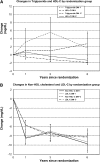Low-fat dietary pattern and lipoprotein risk factors: the Women's Health Initiative Dietary Modification Trial
- PMID: 20164311
- PMCID: PMC2844674
- DOI: 10.3945/ajcn.2009.28034
Low-fat dietary pattern and lipoprotein risk factors: the Women's Health Initiative Dietary Modification Trial
Abstract
Background: The Women's Health Initiative Dietary Modification Trial tested the effects on chronic disease of a dietary pattern lower in fat and higher in vegetables, fruit, and grains.
Objective: The objective was to evaluate the effects of dietary carbohydrate changes on lipids and lipoprotein composition.
Design: Postmenopausal women were randomly assigned to an intervention or a comparison group for a mean of 8.1 y. Lipoprotein analyses and subclasses were based on subsamples of 2730 and 209 participants, respectively.
Results: At year 6, the total reported fat intake was 7.8% lower and carbohydrate intake was 7.6% higher in the intervention group than in the comparison group. Triglyceride change between groups differed by 2.3, 3.8, and -0.8 mg/dL at 1, 3, and 6 y, respectively, and HDL-cholesterol change differed by -1.6, -0.7, and -1.0 mg/dL at 1, 3, and 6 y, respectively. Changes did not differ by age, ethnicity, or obesity. In diabetic intervention women who were white, the triglyceride difference between the intervention and comparison groups was 33.8 mg/dL, whereas in black women with diabetes (n = 50 in the intervention group; n = 83 in the comparison group), the triglyceride difference was 6.4 mg/dL (P for 3-factor interaction = 0.049). No significant changes were observed in apolipoprotein or lipoprotein particles. Reductions in LDL cholesterol varied by quartile of reported lowering of saturated or trans fat.
Conclusions: The replacement of 7-8% of fat intake with complex carbohydrates over 6 y was not associated with clinically adverse effects on triglycerides, HDL cholesterol, or lipoprotein subclasses. Diabetic white women with higher triglyceride concentrations may have greater increases in triglycerides.
Figures



Comment in
-
The WHI joins MRFIT: a revealing look beneath the covers.Am J Clin Nutr. 2010 Apr;91(4):829-30. doi: 10.3945/ajcn.2010.29347. Epub 2010 Feb 24. Am J Clin Nutr. 2010. PMID: 20181816 No abstract available.
References
-
- Keys A. From Naples to seven countries—a sentimental journey. Prog Biochem Pharmacol 1983;19:1–30 - PubMed
-
- American Heart Association Nutrition Committee, Lichtenstein AH, Appel LJ, et al. Diet and lifestyle recommendations revision 2006: a scientific statement from the American Heart Association Nutrition Committee. Circulation 2006;114:82–96 - PubMed
-
- Hellerstein MK. Carbohydrate-induced hypertriglyceridemia: modifying factors and implications for cardiovascular risk. Curr Opin Lipidol 2002;13:33–40 - PubMed
-
- Mensink RP, Zock PL, Kester AD, Katan MB. Effects of dietary fatty acids and carbohydrates on the ratio of serum total to HDL cholesterol and on serum lipids and apolipoproteins: a meta-analysis of 60 controlled trials. Am J Clin Nutr 2003;77:1146–55 - PubMed
Publication types
MeSH terms
Substances
Grants and funding
LinkOut - more resources
Full Text Sources
Medical

